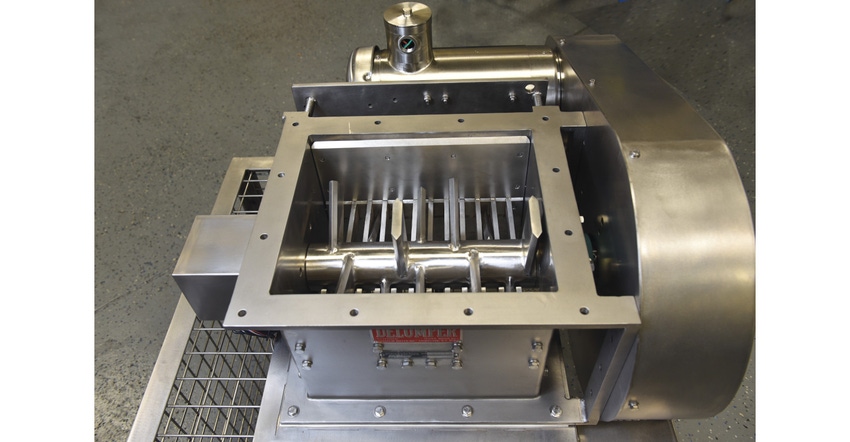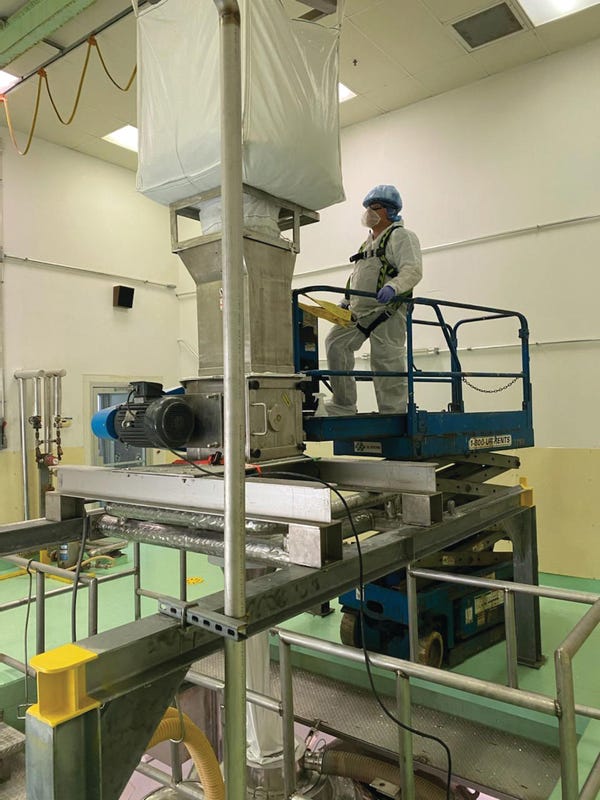How to Choose the Right Industrial Lump Breaker for Your Application
What to ask and what to look for when choosing a lump breaker
March 24, 2022

William Galanty, president, Delumper Div., Franklin Miller Inc.
There are many factors to consider when shopping for and comparing lump breakers for your operation. How do you know exactly what you need or if you’re buying from a reputable company? Do you know if you’re getting a machine that will offer reliability, performance, and safety? The following guide will help you know what questions to ask and what to look for to make sure you choose the proper lump breaker for your particular needs.
Lump breakers are machines that use impact, shear, compression, or abrasion to reduce a variety of solid products to a desired particle size range. Companies are often looking for a high-end industrial machine to assure their material is processed in the most effective, cost-efficient, and safe way, and if necessary, a machine that meets any regulatory or sanitary requirements. The type of lump breaker needed will depend not only on the properties of the material to be reduced, but also on what will be done with the material once it is processed.
Crushers are used to reduce the product as a final step in the production or to condition the product before further processing can be done. They also can eliminate blockages, break agglomerates down to their original particle size, or help in discharging bins and silos. For liquid systems, an inline crusher can be used to enhance liquid flow, protect pumps, and enhance and expedite dissolving and mixing processes. Knowing what happens in the stage after the lump breaker or if it is important to maintain a process pressure or temperature is often important in selecting a suitable machine. A quality lump breaker can improve the material flow properties and feeding of bulk and powders.
Consideration must be given to the product characteristics including density, moisture content, if the material is soft, dry or wet, friable, or sticky when selecting a lump breaker. The starting particle size and target particle size distribution are also important in the selection.
The teeth profile selection--which includes short teeth vs long teeth profile, multi-teeth arrangement as well as teeth thickness--plays important roles in the design. Variable frequency drive for variable speed selection, screen addition and easy screen removal and easy or safe access to the process zone provide for much-needed flexibility and the possibility of using the same machine for multiple products.
Overall machine properties and capabilities will also play a role in your lump breaker choice. Users will want a crusher that promises precise outputs, superior fit and finish, resistance to corrosion or contamination, and severe operating conditions. Reliability is also a major concern for any user.
The operating environment is also an important consideration in the selection. You must consider if the unit is going to be used in a dry, gravity, or wet systems, or is the machine to be operating inline in a pressurized or vacuum system. Another factor to consider is if the unit is to be operating stand-alone or conveyer fed or as part of a full system. Material of construction is another important consideration. Many products are very corrosive or abrasive or can be contaminated by the wrong material of construction.
While lump breaking and crushing is governed by basic laws of physics, no single law or rule can take the place of experience and testing in the selection and sizing of a suitable crusher for a given application. What other factors should you consider for the proper selection of a lump breaker/crusher?
Considerations in Selecting a Crusher
There are many things to consider when selecting an appropriate machine and a suitable lump crusher vendor. This list can help.
Product Properties
Is the product friable, hard, tough, or sticky. Is it heat sensitive? Is the equipment suitable for these product properties?
Output
Will the machine provide the output and consistency required? Will it generate excess unusable dust and fines?
Dust
Will the machine generate excessive amounts of noise and dust?
Capacity
Does the machine have the capacity to handle the present and future load?
Connected System
Is the machine in consideration capable of being installed in the type of connected system and in the orientation needed?
Load
Will the equipment be required to start under full load?
Envelope
Does the equipment fit in the space available with room for maintenance?
Sealing
Does the equipment have a reliable seal design to keep product within the chamber and away from bearings. Is the housing one piece and sealed or is it open with many cracks where product can leak.
Bearings
Is the bearing rating adequate for dependable operation in the application.
Maintenance
Does the equipment selected require a minimum of maintenance? Are the cutters individually replaceable when worn?
Spare Parts
Does the equipment vendor maintain stock of spare parts to get your system back up and running quickly if needed?
Fit and Finish
Is the equipment built with a high-quality fit and finish?
Materials
Is the machine constructed of materials needed to withstand corrosion or abrasive qualities of the material to be processed?
Sanitary
Does the machine need to meet sanitary requirements?
Supplier
Is the equipment backed by a supplier with years of experience and service personnel or is the supplier a garage type operation? Will the supplier provide drawings and documentation for proper evaluation before and after production? Do they build the equipment with the quality and craftsmanship necessary for safe, reliable, long-term service?
Safety
Is the equipment provided with safety features such as interlocks, zero speed, current sensors, and e-stops necessary for operator safety?
Controls
Does the supplier offer controls matched to the requirements of the breaker?
Auxiliary Equipment
Can the supplier offer a comprehensive package of auxiliary system components needed for the application such as stands, hoppers, chutes, conveyors, valves, and more.
William Galanty is president, Delumper Div., Franklin Miller Inc. (Livingston, NJ), a manufacturer of size reduction technology, including crushers, shredders, grinders, wastewater treatment systems, etc. For more information, call 973-933-6793 or visit franklinmiller.com.
You May Also Like


